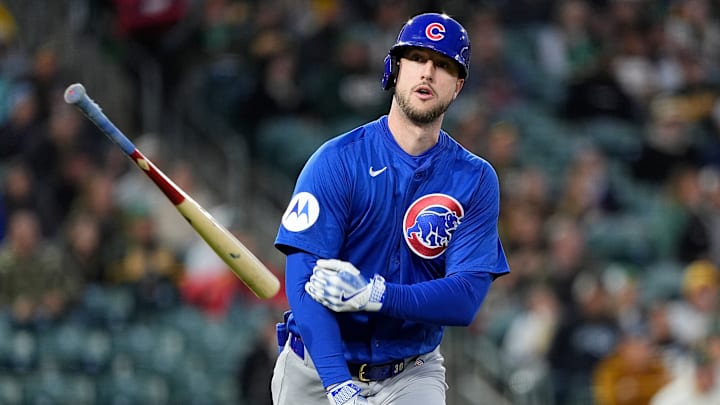The Chicago Cubs are 5-4 in the imminently winnable NL Central. Unless this is the year we finally see the St. Louis Cardinals break through (a funny but entirely possible outcome), Chicago should win the division. Milwaukee has finally bottomed out and the Reds appear incapable of generating offense. The Pirates, well ... are the Pirates.
Finally, after years of deliberate hedging and exhibiting a complete unwillingness to break the bank on top talent, Chicago dealt for a bonafide superstar in Kyle Tucker this past offseason. It has paid off immediately; Tucker has a 1.228 OPS and four home runs through nine games. The Cubs feel like the best team in the division on paper, with a solid starting rotation, elite defense and a true centerpiece to build the lineup around.
But what happens next season? Is this all for naught? The Cubs gave up serious prospect capital to acquire Tucker, but he's in the final year of his contract and it took immense public pressure for Chicago to even avoid arbitration with a top-10 player. The idea of Chicago forking over $500 million-plus to keep Tucker feels far-fetched.
That leads us to Cubs ownership, the bane of existence for so many baseball fans in the Midwest. The Cubs are a totemic franchise in MLB, with a rich history and a sterling profit margin. Ownership doesn't want to hear any of that, though, because the Cubs just don't want to spend at the same rate as other premium contenders.
For more news and rumors, check out MLB Insider Robert Murray’s work on The Baseball Insiders podcast, subscribe to The Moonshot, our weekly MLB newsletter, and join the discord to get the inside scoop during the MLB season.
Cubs ownership continues to set the table for Kyle Tucker's free agency departure next winter
Chicago has one of the best payroll-to-income ratios in MLB, which is precisely the problem. The Cubs are a cash cow — a profit-turning organization with a dedicated fanbase and plenty of real estate on Chicago's North Side. In theory, that means ownership has plenty of money to toss around in free agency.
how much revenue each MLB team generated last year, and how much of that is going towards their payroll this year pic.twitter.com/UAZmHhaR8a
— BrooksGate (@Brooks_Gate) March 29, 2025
And yet, Chicago's president of business operations, Crane Kenney, maintains that it's not so simple. That Chicago has other business demands, and thus cannot afford to dole out billions of dollars like the Dodgers or Mets.
"Talking about team revenue and payroll without including the other investments in baseball and business operations, as well as the impact of revenue sharing, does not show the whole picture," Kenney told The Athletic ($).
Jed Hoyer, Chicago's beleaguered leader of baseball ops, echoed that sentiment.
"The focus should not be on payroll. Last season we went over the luxury tax and we ultimately didn’t win. That’s on me. I think we’ve built a better team this year and I’m excited for the season."
Look, Hoyer is right — he could just be bad at his job — but this narrative of financial strain is ridiculous. I am not a businessman and I do not confess myself privy to the inner workings of the Cubs' real estate machine, but every club has expenses outside of baseball. The Cubs presumably make money from tours of Wrigley Field and their other investments on the North Side. The idea that Chicago, unlike other high-earning teams, can't afford to pay players and splurge on the luxury tax is utterly preposterous.
I'm not sure how a single Cubs fan can feel good about Tucker's future right now. He's raking in the middle of his prime, which means Chicago will need to survive an aggressive marketplace in free agency. Even with other big spenders like L.A. and New York limited by their own excessive payrolls, Tucker is going to conjure a hefty paycheck. The Cubs sure don't sound like a team willing to hand it out.
This is a genuine travesty, and Cubs fans deserve so much better. Hopefully Hoyer holds his ground and ponies up, but with the Ricketts family so averse to running up the tab, it's hard to imagine this exciting partnership between Tucker and the North Side ending in anything but heartbreak.
